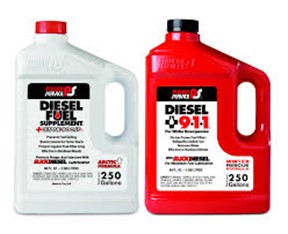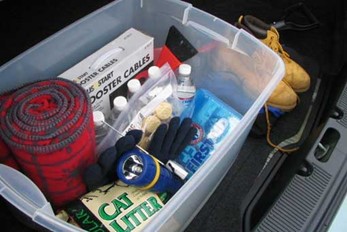Prepare for the Cold Weather
As we approach the first day of fall, it's crucial to prepare for the upcoming cold weather, especially for those involved in truck operations. Ensuring that drivers are equipped to maintain optimal truck performance during the winter months is of utmost importance. From using fuel additives to creating a cold weather survival kit and addressing the occupational hazards faced by truck drivers, there are several key considerations to keep in mind. Let's delve into these important aspects to ensure a safe and efficient winter season for truck operations.
In this issue:
Fuel Additive Use during Cold Weather Conditions
How to Make a Cold Weather Survival Kit
October 9-14 is Fire Prevention Week
Registration Open for the 2024 Idealease/NPTC Safety Seminars!
Read, share, and/or print this week's Safety Bulletin.
Check out past Idealease Safety Bulletins.
As we welcome the first day of fall this Sunday, it's crucial to gear up our operations for the upcoming cold weather. It's imperative to ensure that our drivers are well-versed in the essential measures required to maintain optimal truck performance during the winter months.
Fuel Additive Use during Cold Weather Conditions
To prevent fuel from jelling, it's advisable to use additives when the surrounding temperature drops below 32°F. Power Service and Penray, well-known fuel additive manufacturers, offer various products that can be purchased through Navistar and Idealease locations.

Power Service:
- The "Red Bottle," known as Power Service 911, should be used only when the fuel in a unit has already jelled.
- 911 is NOT to be used as a fuel additive that you regularly put in the fuel tank to keep the fuel from jelling.
- Power Service Diesel Fuel Supplement + Cetane "White Bottle" will be added to the fuel at each fill when the ambient temperature is < 30 degrees F. This is the additive you should use regularly during the winter months.
Penray:
Winter Than Emergency Diesel Fuel Supplement
- Dissolves already gelled fuel fast and reduces clogging of fuel filters. Prevents ice crystal build-up in fuel lines and filters by disbursing moisture.
- It eliminates hard starting, pounding, excessive smoking and helps improve combustion. 100% compatible with low sulfur fuel and fuel blends.
Winter Pow-R Plus Diesel Fuel Supplement
- ULSD compliant
- Prevents diesel fuel gelling
- Prevents ice crystal formation
- Reduces cold filter plug point by up to 30 degrees
- Enhances cetane levels
- Improves fuel economy
- Utilizes HAFI® technology
- Aids cold weather starting
- Stabilizes fuel and prevents corrosion
- Helps reduce emissions
- Improves lubricity
How to Make a Cold Weather Survival Kit 
It's crucial for everyone to have a Winter Survival Kit in their truck. In an emergency, it could truly be a lifesaver. Here's what your Winter survival kit checklist:
- A shovel
- Windshield scraper and small broom
- Flashlight with extra batteries
- Battery powered radio
- Water
- Snack food including energy bars, raisins, and mini candy bars
- Matches and small candles
- Disposable Hand/Foot warmers
- Extra hats, socks and mittens
- First aid kit with a pocket knife
- Necessary medications
- Blankets or sleeping bag
- Tow chain or rope
- Road salt, sand, or cat litter for traction
- Booster cables
- Fluorescent distress flag and whistle to attract attention
- Cell phone adapter to plug into lighter and or extra battery supply
Driving a Truck is a Dangerous Job!
When considering risky occupations, people often think of police officers, firefighters, and construction workers. However, the Bureau of Labor Statistics shows that being a tractor-trailer truck driver comes with unexpected risks. It's crucial to be aware of the potential hazards in your job and take the necessary precautions.
For instance:
- One out of every seven American workers killed on the job is a tractor-trailer truck driver.
- In 2022, 625 tractor-trailer truck drivers were killed while working, with 78% of these deaths caused by transportation incidents.
- Tractor-trailer truck drivers have the highest number of nonfatal injuries and illnesses that require time off from work, ranking 6th among all occupations.
Truck drivers are three times more likely than the average American worker to experience an injury or illness that requires time off. The most common causes of missed work are slips, trips, and falls, followed by overexertion during loading and unloading.
It's essential to address musculoskeletal disorders, common among truck drivers due to overexertion and prolonged sitting with potentially poor posture while driving. Recovery from injuries can take longer for truck drivers, with half of them requiring at least 20 days away from work after an incident.
The Federal Motor Carrier Safety Administration (FMCSA) is actively working to reduce the number and severity of crashes involving large commercial trucks and buses. Employers can also consult the Occupational Safety and Health Administration (OSHA) for information on preventing musculoskeletal disorders in the workplace.
By understanding and addressing these issues, employers can improve conditions for tractor-trailer drivers, and workers can be empowered with knowledge about potential hazards.
October 8-14 is Fire Prevention Week
National Fire Prevention Week is coming, and it is a good time to review with your drivers how to prevent fires and how to react to a fire that occurs in their commercial motor vehicle.
Fire extinguisher inspection is a vital part of a driver’s daily vehicle inspection process. It amazes me how many times I will be looking at a truck and find the fire extinguisher has lost it pressure due to a leak or it was used and returned to the truck without being recharged. The actions of a driver at the time of a fire are crucial in saving lives and controlling the amount of loss.
Registration is Open Online for the 2024 Idealease/NPTC Safety Seminars!

Idealease and the National Private Truck Council NPTC will again be hosting safety seminars in 2024. The one-day seminar this year will focus on data available from trucks today with regards to safety, basic safety and compliance, regulation changes and CSA. The seminars and will be provided to all Idealease customers, potential customers and NPTC members at no charge. The seminar provides important information applicable for both the novice an
10/1/24: St. Louis, MO
10/8/24: Boston, MA
10/9/24: Linthicum, MD
10/11/24: Providence, RI
10/15/24: Newark, NJ
10/16/24: Atlanta, GA
10/17/24: Nashville, TN
10/17/24: Charleston, WV
10/28/24: Stockton, CA
